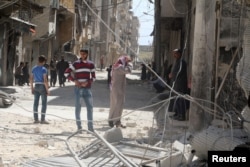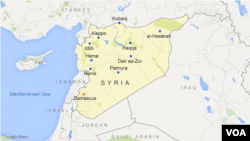In a move widely interpreted as a signal that Syrian President Bashar al-Assad has no intention of stepping down, his regime went ahead Wednesday with parliamentary elections dubbed a "farce" by political activists, rebel commanders and Western governments.
As voting got underway in government-controlled areas of the war-shattered country, there was no suspense about the likely results. Those will be announced later this week.
Government loyalists – either members of Assad’s ruling Arab Socialist Ba’ath Party and its affiliates or handpicked candidates elected as "farmers and laborers" – were expected to pack the parliament, as they did the previous one, elected as the uprising against Assad began nearly five years ago.
A smiling Assad and his British-born wife, Asma, were pictured on the Syrian leader’s Facebook page voting early in the controversial polls.
As he left the polling station at al-Assad Library, a statement was released to the media. It quoted the Syrian leader quoted as saying: "The Syrian people are engaged in a war that has been going on for five years, through which terrorism managed to shed innocent blood and destroy much infrastructure, but it failed in achieving the primary goal it was assigned, which is destroying the principle structure in Syria, meaning the social structure of the national identity."
In February, just before a truce was declared, Assad announced his intention to hold parliamentary elections April 13. He issued a decree for polling to choose the country’s 250-member legislature, known as the People’s Council, which is elected for a four-year term.
Wednesday’s voting came amid signs that the shaky cease-fire, which has reduced rather than ended hostilities, is close to collapse.
Aleppo offensive
Earlier this week, the government, with Russian-backing, started an offensive on the rebels around Aleppo. Opposition fighters and al-Qaida affiliate Jabhat al-Nusra mounted concerted efforts to reclaim villages south of Syria’s one-time commercial capital and territory in the coastal province of Latakia, the heartland of Assad’s minority Alawite sect, an offshoot of Shia Islam.
The Syrian National Coalition, the main Western-backed umbrella opposition group, warned Wednesday that the Assad regime is preparing for a large-scale offensive on Aleppo in "blatant violation" of the "cessation of hostilities" agreement.
"The Assad regime has clearly decided to escalate attacks on the Syrian people, taking advantage of the Russian and Iranian support and using the fight on terror as a pretext to justify these attacks," the coalition said in a statement.
In the runup to elections, regime-held parts of the country saw signs of campaigning by the almost 3,500 candidates vying for seats. Their posters plastered streets. Regime officials pointed to electioneering as evidence of the polls' authenticity.
State media on Wednesday broadcast footage of enthusiastic crowds pouring into the polling station at the Hejaz train station in downtown Damascus and people in a government-held district of Aleppo chanting, "Allah, Syria, Bashar – and that’s all we need."
Polling issues
But about 7,000 candidates withdrew just before the elections, and more than half of the country had no polling stations. The 4 million Syrians who have fled for neighboring countries cannot vote. In northeast Syria, Kurds boycotted the election.
French foreign ministry spokesman Romain Nadal said: "France denounces this sham of an election organized by the regime. They are being held without campaigning, under the auspices of an oppressive regime and without international observation."
That wasn’t the view of Moscow, which, like the Assad regime, claimed Wednesday that the elections highlight Assad’s legitimacy.
Russia’s foreign minister, Sergei Lavrov, said the voting was intended to avoid a "legal vacuum" while negotiators in the United Nations-brokered peace talks – which resumed Wednesday in Geneva – try to come up with a political transition.
"There is an understanding already that a new constitution should emerge as a result of this political process, on the basis of which new, early elections are to be held," Lavrov said. "… These elections held today are designed to play this role of not allowing a legal vacuum."
Watch video report from VOA's Zlatica Hoke:
Skepticism over peace talks
But there is little confidence among opposition and Western negotiators that peace talks will be successful anytime soon.
Rebel and regime negotiators have not even met face-to-face so far in the Geneva talks. The U.N. envoy for Syria, Staffan de Mistura, has said he wants the second round of peace talks starting this week to focus on concrete steps toward a political transition. Damascus and foreign allies Russia and Iran insist that Assad should remain in power; the rebels insist he goes.
The Syrian government says its representatives will join the talks on Friday, after elections are over.
Despite the cease-fire, violence has ticked upward in Syria in recent days. France, Iran, Russia and the United States have all voiced concern over fighting near Aleppo this week.
Samantha Power, the U.S. permanent representative to the United Nations, warned Tuesday that escalating violence in Aleppo province threatened to derail the Geneva talks. Power said that Washington is "very alarmed" at the regime’s announcement of a major offensive south of the city of Aleppo and that Russia needed to "get the regime back with the program."
Polling progress
In a statement to the government-owned SANA news agency, the head of Higher Judicial Committee for Elections, Judge Hisham al-Shaar, said the elections were proceeding well, with no complaints. And SANA reported that voter turnout was strong at 2,000 polling stations in Damascus, 17 in Deir ez-Zor, 1,047 in Latakia, 661 in Homs, 347 in Sweida, 741 in Hama, 368 in Hasaka and 816 in Tartous.
But independent journalists and political activists said voter turnout was more of a trickle away from showcased polling stations in the capital.















